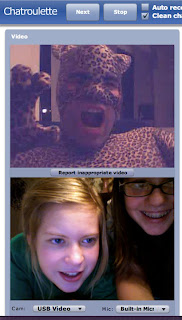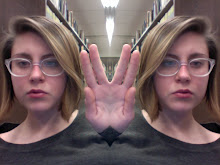Chatroulette is the latest dream of unfettered social connectivity. Within the last month, is has separated itself from the explosion of recently launched social networking services, such as Google Buzz, and disproved naysaying bloggers who wrote it off as a dumb curiosity. The site was created by Andrey Ternovskiy, a 17 year-old from Russia, in reaction to his boredom with web-based services such as Skype, where he was limited to communicating with users he knew. He envisioned a web-server that was globally linked, and would randomly connect him with any user on the same site.
Ternovskiy turned to his knowledge of html coding to build a new breed of social networking, and in the process, reinstated nearly every myth we've devised to explain the seemingly uncharted depths of the internet. What lies at the heart of Chatroulette is the uneasy experience that permeates one's interactions with the fathomless sweep the internet projects into the physical space in which we are located.
Chatroulette combines the familiar elements of popular internet-based communication services; the site essentially combines the picture quality of a Skype chat, sans the audio, with a text box reminiscent of instant messaging. Unlike these services, you don't need an account to begin using the site; the only prerequisites are a webcam and an internet connection. You begin by clicking the "play" button, and you're instantly hooked to one of the thousands of strangers connected to the site's global server.
The experience that ensues feels like pulling a gun trigger: users voluntarily give the representations of their bodies over to both the eye of a webcam and the probing eye of a stranger. Chatroulette's guiding logic is that of mutually-understood people surfing. Connections and rejections are instantaneous, occurring within the time frame of a single click or keystroke.
The process is mostly visual; interest is piqued mainly through appearance because most users do not enable microphones (from what I can tell). Males outnumber females at least five to one, so one can only imagine some of the cruder visual gags that pop up within several minutes' surfing. More often than not, though, users seem more fascinated with the process of seeing different faces flick across the screen, pushing the "next" button over and over.
To assert your place in the ever-shifting ground of user interest, you are forced, in one way or another, to perform something of yourself for the low-res camera, in which you see yourself typing stupidly into the keyboard one of the many "yo wat up" 's of your session. I came away from several sessions of Chatroulette feeling drained and disjointed , glad to be out of the claustrophobic confines of the screen.
The utopic vision of perfect equality, is one of the many assumptions we've made about the nature of the internet, and one of the ideas which defines Chatroulette's raison d'etre. This myth de-emphasizes the personal sacrifices that must be made in order to enter the internet's seemingly utopic space. According to new media theorist Lev Manovich, one must willingly sacrifice a degree physical and/or psychological mobility in order to engage in nearly any form of mass-distributed entertainment. For example, to see a movie in a movie theater means sitting in a dark room for a certain amount of time; to play a video game means to surrender bodily movement to the controllers one uses to navigate the game. In the case of Chatroulette, we have to surrender our image to the screen and limit our mobility to the what can be captured by the webcam.
The surrender of body and self to the site is the tension which many journalists in the past month have struggled to dissect in the increased coverage of the Chatroulette phenomenon. If nothing else, Chatroulette has left a deeply personal mark on the style of reportage that has grown out of the flurry of coverage from major publications. In his article for New York Magazine, Sam Anderson said he felt like an insecure 12-year old all over again, braving school yard taunts condensed into nano-second rejections from Chatroultte's users. His, and similar reactions, bring the seemingly incomprehensible enormity of cyberspace into our own psyche. Chatroulette's significance lies in its ability to highlight the subtle ways in which the internet, and the connections forged within it, is unknowable precisely because it reflects itself onto our internal constructions of self-hood.
Subscribe to:
Post Comments (Atom)



No comments:
Post a Comment